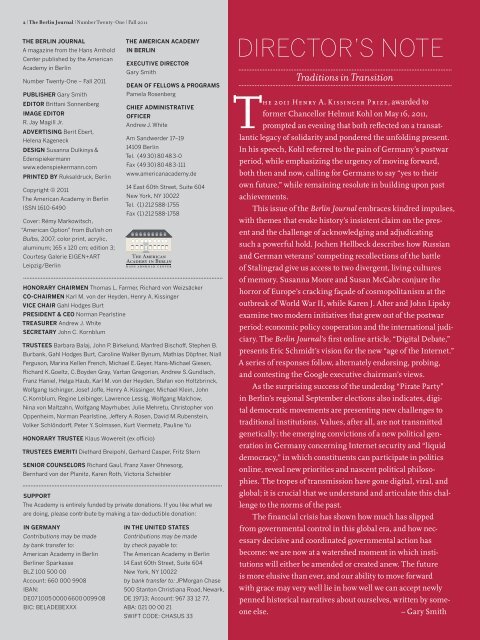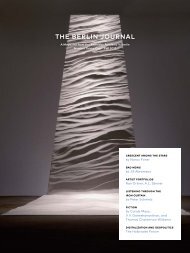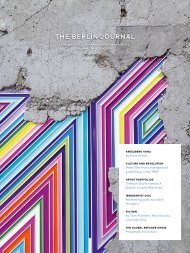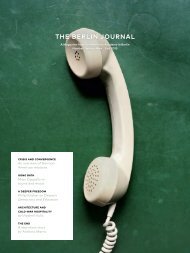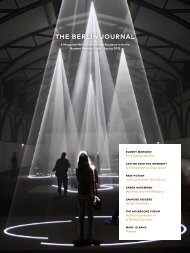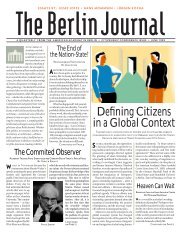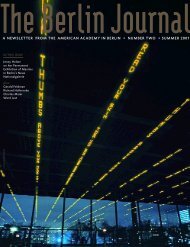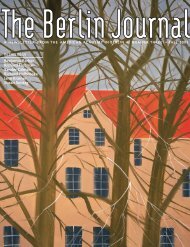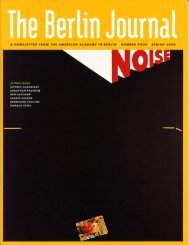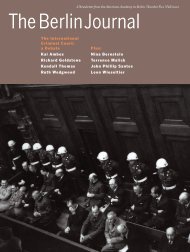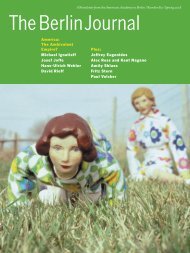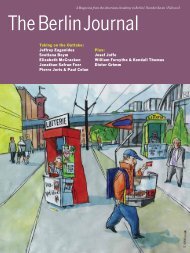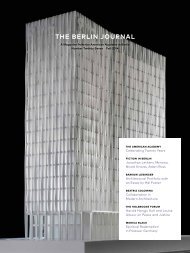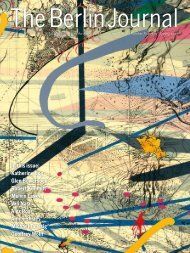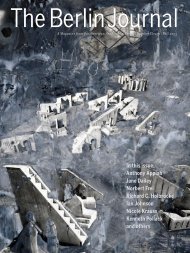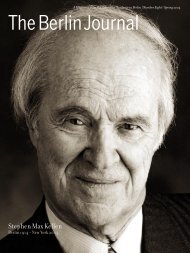Fall 2011 | Issue 21
- No tags were found...
You also want an ePaper? Increase the reach of your titles
YUMPU automatically turns print PDFs into web optimized ePapers that Google loves.
2 | The Berlin Journal | Number Twenty-One | <strong>Fall</strong> <strong>2011</strong><br />
THE BERLIN JOURNAL<br />
THE AMERICAN ACADEMY<br />
A magazine from the Hans Arnhold IN BERLIN<br />
Center published by the American<br />
EXECUTIVE DIRECTOR<br />
Academy in Berlin<br />
Gary Smith<br />
Number Twenty-One – <strong>Fall</strong> <strong>2011</strong><br />
DEAN OF FELLOWS & PROGRAMS<br />
PUBLISHER Gary Smith<br />
Pamela Rosenberg<br />
EDITOR Brittani Sonnenberg<br />
CHIEF ADMINISTRATIVE<br />
IMAGE EDITOR<br />
OFFICER<br />
R. Jay Magill Jr.<br />
Andrew J. White<br />
ADVERTISING Berit Ebert,<br />
Helena Kageneck<br />
Am Sandwerder 17–19<br />
14109 Berlin<br />
DESIGN Susanna Dulkinys &<br />
Tel. (49 30) 80 48 3-0<br />
Edenspiekermann<br />
www.edenspiekermann.com<br />
Fax (49 30) 80 48 3-111<br />
www.americanacademy.de<br />
PRINTED BY Ruksaldruck, Berlin<br />
14 East 60th Street, Suite 604<br />
Copyright © <strong>2011</strong><br />
New York, NY 10022<br />
The American Academy in Berlin<br />
Tel. (1) <strong>21</strong>2 588-1755<br />
ISSN 1610-6490<br />
Fax (1) <strong>21</strong>2 588-1758<br />
Cover: Rémy Markowitsch,<br />
“American Option” from Bullish on<br />
Bulbs, 2007, color print, acrylic,<br />
aluminum; 165 x 120 cm; edition 3;<br />
Courtesy Galerie EIGEN+ART<br />
Leipzig/Berlin<br />
HONORARY CHAIRMEN Thomas L. Farmer, Richard von Weizsäcker<br />
CO-CHAIRMEN Karl M. von der Heyden, Henry A. Kissinger<br />
VICE CHAIR Gahl Hodges Burt<br />
PRESIDENT & CEO Norman Pearlstine<br />
TREASURER Andrew J. White<br />
SECRETARY John C. Kornblum<br />
TRUSTEES Barbara Balaj, John P. Birkelund, Manfred Bischoff, Stephen B.<br />
Burbank, Gahl Hodges Burt, Caroline Walker Bynum, Mathias Döpfner, Niall<br />
Ferguson, Marina Kellen French, Michael E. Geyer, Hans-Michael Giesen,<br />
Richard K. Goeltz, C. Boyden Gray, Vartan Gregorian, Andrew S. Gundlach,<br />
Franz Haniel, Helga Haub, Karl M. von der Heyden, Stefan von Holtzbrinck,<br />
Wolfgang Ischinger, Josef Joffe, Henry A. Kissinger, Michael Klein, John<br />
C. Kornblum, Regine Leibinger, Lawrence Lessig, Wolfgang Malchow,<br />
Nina von Maltzahn, Wolfgang Mayrhuber, Julie Mehretu, Christopher von<br />
Oppenheim, Norman Pearlstine, Jeffery A. Rosen, David M. Rubenstein,<br />
Volker Schlöndorff, Peter Y. Solmssen, Kurt Viermetz, Pauline Yu<br />
HONORARY TRUSTEE Klaus Wowereit (ex officio)<br />
TRUSTEES EMERITI Diethard Breipohl, Gerhard Casper, Fritz Stern<br />
SENIOR COUNSELORS Richard Gaul, Franz Xaver Ohnesorg,<br />
Bernhard von der Planitz, Karen Roth, Victoria Scheibler<br />
SUPPORT<br />
The Academy is entirely funded by private donations. If you like what we<br />
are doing, please contribute by making a tax-deductible donation:<br />
IN GERMANY<br />
IN THE UNITED STATES<br />
Contributions may be made Contributions may be made<br />
by bank transfer to:<br />
by check payable to:<br />
American Academy in Berlin The American Academy in Berlin<br />
Berliner Sparkasse<br />
14 East 60th Street, Suite 604<br />
BLZ 100 500 00<br />
New York, NY 10022<br />
Account: 660 000 9908<br />
by bank transfer to: JPMorgan Chase<br />
IBAN:<br />
500 Stanton Christiana Road, Newark,<br />
DE07 1005 0000 6600 0099 08 DE 19713; Account: 967 33 12 77,<br />
BIC: BELADEBEXXX<br />
ABA: 0<strong>21</strong> 00 00 <strong>21</strong><br />
SWIFT CODE: CHASUS 33<br />
DIRECTOR’S NOTE<br />
Traditions in Transition<br />
The <strong>2011</strong> Henry A. Kissinger Prize, awarded to<br />
former Chancellor Helmut Kohl on May 16, <strong>2011</strong>,<br />
prompted an evening that both reflected on a transatlantic<br />
legacy of solidarity and pondered the unfolding present.<br />
In his speech, Kohl referred to the pain of Germany’s postwar<br />
period, while emphasizing the urgency of moving forward,<br />
both then and now, calling for Germans to say “yes to their<br />
own future,” while remaining resolute in building upon past<br />
achievements.<br />
This issue of the Berlin Journal embraces kindred impulses,<br />
with themes that evoke history’s insistent claim on the present<br />
and the challenge of acknowledging and adjudicating<br />
such a powerful hold. Jochen Hellbeck describes how Russian<br />
and German veterans’ competing recollections of the battle<br />
of Stalingrad give us access to two divergent, living cultures<br />
of memory. Susanna Moore and Susan McCabe conjure the<br />
horror of Europe’s cracking façade of cosmopolitanism at the<br />
outbreak of World War II, while Karen J. Alter and John Lipsky<br />
examine two modern initiatives that grew out of the postwar<br />
period: economic policy cooperation and the international judiciary.<br />
The Berlin Journal’s first online article, “Digital Debate,”<br />
presents Eric Schmidt’s vision for the new “age of the Internet.”<br />
A series of responses follow, alternately endorsing, probing,<br />
and contesting the Google executive chairman’s views.<br />
As the surprising success of the underdog “Pirate Party”<br />
in Berlin’s regional September elections also indicates, digital<br />
democratic movements are presenting new challenges to<br />
traditional institutions. Values, after all, are not transmitted<br />
genetically; the emerging convictions of a new political generation<br />
in Germany concerning Internet security and “liquid<br />
democracy,” in which constituents can participate in politics<br />
online, reveal new priorities and nascent political philosophies.<br />
The tropes of transmission have gone digital, viral, and<br />
global; it is crucial that we understand and articulate this challenge<br />
to the norms of the past.<br />
The financial crisis has shown how much has slipped<br />
from governmental control in this global era, and how necessary<br />
decisive and coordinated governmental action has<br />
become: we are now at a watershed moment in which institutions<br />
will either be amended or created anew. The future<br />
is more elusive than ever, and our ability to move forward<br />
with grace may very well lie in how well we can accept newly<br />
penned historical narratives about ourselves, written by someone<br />
else.<br />
– Gary Smith


